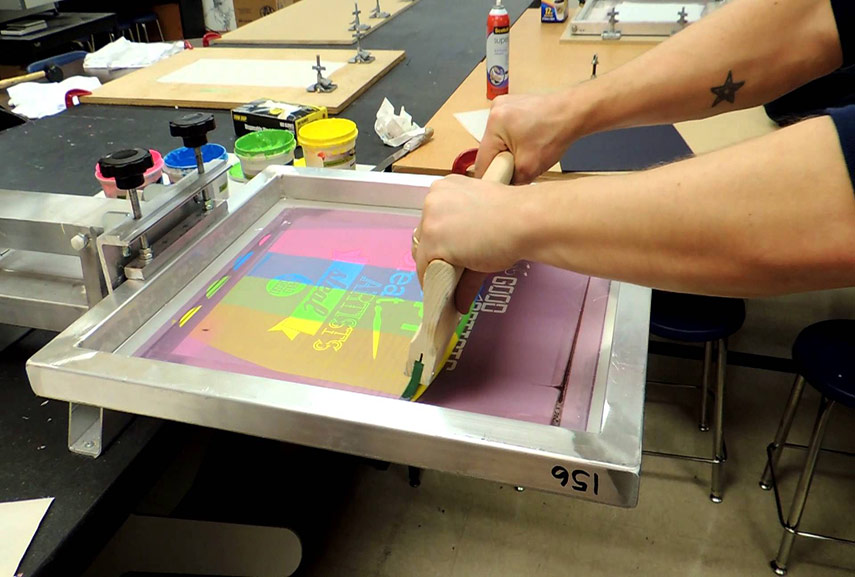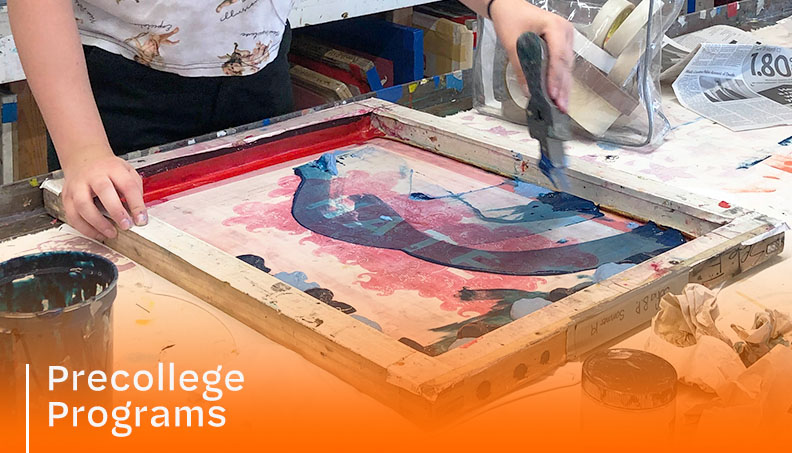The Important Guide to Comprehending Screen Printing and Its Versatile Makes use of
Screen printing has a rich background that goes back to ancient times, evolving into an advanced technique utilized across various industries today. This guide explores the intricacies of the screen printing process, detailing its applications in home, advertising and marketing, and fashion style - 10:9 Design contact. Comprehending these basics can open up innovative possibility for both business and creative projects. The adhering to sections will certainly reveal crucial pointers and methods to enhance one's screen printing ventures
The Background of Screen Printing
Although screen printing has origins that map back centuries, its evolution reflects the artistic and technological developments of various cultures. Coming from old China, the strategy was originally made use of for decorating textiles and later spread to Japan, where it came to be essential to Ukiyo-e woodblock printing. The technique shifted to Europe in the 18th century, where it got popularity amongst craftsmens and industrial printers. The creation of image emulsion in the 20th century changed screen printing, permitting for even more complex layouts and better effectiveness. Musicians like Andy Warhol even more drove its appeal, utilizing the medium to create famous jobs that blended commercialism and art. By the late 20th century, screen printing had actually established itself as a functional method, employed in vogue, advertising, and fine art. Today, it continues to evolve, integrating digital technology and broadening its applications throughout different industries.
The Screen Printing Process Explained
Screen printing transforms artistic visions right into tangible styles with a collection of precise actions. A picture is produced and after that moved onto a screen, usually made of great mesh textile stretched over a structure. A light-sensitive solution is used to the screen, which is subjected to light, hardening in locations not covered by the picture. After rinsing the unhardened emulsion, a stencil is created.
Next off, the screen is placed over the substrate, whether it be fabric, paper, or an additional product. Ink is after that pushed through the open areas of the stencil utilizing a squeegee, depositing the style onto the substratum below. This process can be duplicated for numerous shades, requiring separate displays for each shade. Lastly, the published product is treated making use of warmth to assure the ink sticks effectively, causing a durable, dynamic design all set for usage.
Sorts Of Screen Printing Techniques

Furthermore, specialized strategies, such as discharge screen printing, get rid of dye from the textile to develop softer prints, while aluminum foil screen printing applies metallic foil to attain a glossy coating (10:9 Design near me). Each method uses distinct qualities, accommodating numerous imaginative demands and manufacturing ranges, ultimately expanding the possibilities within the screen printing domain name
Applications of Screen Printing in Various Industries

Furthermore, the signage and advertising markets use screen printing for developing captivating screens and banners. This approach enables for strong shades and complex designs that catch attention. In electronic devices, screen printing is employed for applying conductive inks to circuit boards, crucial for over here component connections. The home decoration industry embraces screen printing to create distinctive layouts on textiles visit this site and wall art. Generally, screen printing offers as a vital tool across varied areas, enhancing items with individualized and aesthetically enticing graphics.
Tips for Effective Screen Printing Projects
While taking on a screen printing project, careful interest to information can significantly enhance the final outcome. First, choosing premium products is necessary; this consists of the screen, inks, and substratums. Utilizing proper mesh counts can impact ink deposition and detail resolution. Prep work is equally important; comprehensive cleaning of displays and appropriate direct exposure times ensure crisp prints.
Next off, exact enrollment is critical for multi-color prints. Utilizing placement devices can help attain specific layering. Additionally, screening prints on scrap materials prior to manufacturing aids determine possible issues without wasting sources.

Often Asked Concerns
What Products Are Finest for Screen Printing on Material?
Cotton and polyester blends are ideal for screen printing on textile due to their toughness and ink absorption. Additionally, specialty textiles like silk or canvas can generate special appearances and coatings, enhancing the general style high quality.
Exactly how Do I Clean and Maintain Screen Printing Tools?
To keep and clean up screen printing large format signage equipment, one ought to consistently wash screens with proper solvents, inspect mops for wear, oil moving components, and store all items in a dry, dust-free environment to lengthen their life-span.
What Are the Ecological Impacts of Screen Printing?
Screen printing can have substantial ecological effects, consisting of chemical waste from inks and solvents, water use throughout cleansing procedures, and energy intake. Eco-friendly products and lasting techniques are crucial for decreasing these unfavorable impacts.
Can Screen Printing Be Done at Home Successfully?
Screen printing can be properly done at home with the appropriate materials and methods. Hobbyists can produce high quality prints, though success depends upon their skill level, tools, and understanding of the process involved.
What Are the Expenses Connected With Beginning a Display Printing Business?

Beginning a screen printing organization entails costs for devices, materials, and work area. Preliminary expenditures usually range from a few hundred to a number of thousand bucks, depending upon the scale, top quality of equipment, and desired manufacturing ability.
Screen printing has an abundant background that dates back to old times, developing into an advanced technique used throughout various sectors today. An additional technique, rotary screen printing, utilizes cylindrical displays, assisting in constant printing on textile rolls, therefore boosting efficiency for massive manufacturings. In addition, specialized methods, such as discharge screen printing, get rid of color from the material to produce softer prints, while foil screen printing applies metallic foil to accomplish a glossy coating. In the fashion market, screen printing is extensively made use of to develop vibrant styles on garments, making it possible for brand names to showcase their special styles. Cotton and polyester blends are perfect for screen printing on textile due to their toughness and ink absorption.